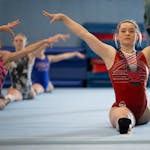The U.S. Olympic & Paralympic Committee is still waiting to learn many details about the COVID-19 prevention measures for the upcoming Beijing Winter Games. One thing it does know: Olympic participants must be fully vaccinated, with very few exceptions.
The USOPC already has its own vaccine mandate in place, announced last month. While officials said "a very small minority'' of athletes have objected, they will have no choice if they qualify for the Winter Games in February. At a virtual news conference earlier this week, Dr. Jonathan Finnoff, chief medical officer for the USOPC, said China's mandate is even more stringent.
Unlike the USOPC directive, which allows medical and religious exemptions, Beijing Olympic officials will permit only "justified medical exemptions.'' The mandate applies to everyone playing a role at the Games, including coaches, staff and media.
"If an athlete does not receive a medical exemption from Beijing and they choose not to get vaccinated, they will not be able to enter China,'' said Finnoff, former director of the Mayo Clinic Sports Medicine Center in Minneapolis. "If they apply for an exemption because they have an allergy or some other contraindication, they'll have to go through a 21-day quarantine.
"These are challenging times. But the vaccine policy we've put in place, and that China has put in place, is going to make the Games as safe as possible.''
Beijing Olympic officials are expected to release the first list of detailed COVID-19 protocols this month. In addition to the vaccine mandate, some other general rules have been announced.
When Olympic participants arrive in Beijing, they will enter a "closed-loop management system,'' with their movements limited to Olympic-related sites. All will be subject to daily COVID-19 testing, and no international fans will be permitted. Spectators from mainland China can attend Olympic events if they comply with disease-prevention measures.
Last summer's Tokyo Olympics had similar rules, though there was no vaccine mandate and no spectators were allowed. In addition, Finnoff said, Beijing is requiring international Olympic delegations to travel by charter flight, and the size of those delegations will be limited.
At the Tokyo Games, the USOPC said 83% of its athletes were vaccinated. Still, several tested positive for COVID-19. In September, the USOPC declared everyone using its facilities must be fully vaccinated by Nov. 1, and all athletes hoping to win an Olympic berth must be vaccinated by Dec. 1.
"The vast majority of people we've been talking to are really excited about this and feel this is the right way to go,'' Finnoff said. "We're having one-on-one conversations with those who are disappointed with this, so we can talk through why they're disappointed and why we made this decision.''
At the virtual news conference, USOPC leaders also said they do not expect more calls for a boycott of the Beijing Games. Some human rights advocates are pushing for a boycott because of China's forced detention of its Uighur Muslim population.




